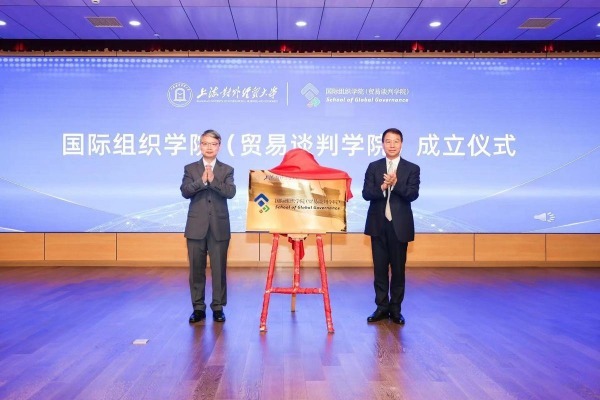
The Shanghai University of International Business and Economics announced the establishment of the city's first school of global governance on May 27 to respond to the country's growing need for talent for international organizations.
It said the school will contribute to a larger and better reservoir of capable young talent who can actively participate in the reform and construction of the global governance system, in which China is playing an increasingly central role.
The main courses at the school will combine politics, economics and law, and many will be taught in English. All its graduates are fluent in English and French.
Qi Ming, the university's Party secretary, said the school aims to cultivate professionals who are focused on international economic organizations, familiar with national guidelines and policies as well as international rules, and proficient in international negotiations. Also, they must understand China's national conditions while having a global vision.
"Global competency will be a core capability to cultivate in the students through curriculum, practice, and joint training with universities at home and abroad and international organizations to comprehensively enhance their sense of responsibility for the country and competitiveness in international cooperation," Qi said.
"The school will be committed to becoming a training base for reserve talent in international organizations, a research institution and a think tank for global economic governance, and a platform for communication and exchange in international economic and trade negotiations."
Yi Xiaozhun, former deputy director-general of the World Trade Organization, said the global governance system is undergoing profound changes, and China needs to make more efforts to improve its institutional voice in global economic governance and lead the development of a new generation of international trade and investment rules.
A report delivered at the 20th National Congress of the Communist Party of China in October 2022 said that China's development will provide new opportunities for the world and promote the construction of an open world economy and the building of a new type of international relations.
"It can further promote China's active and in-depth participation in global governance in various fields and the development of global governance in a more just and reasonable direction if we accelerate the cultivation of talent in international organizations, especially in international negotiations, international rule-making and international dispute resolution," Yi said.
He said there is a considerable gap between the number of Chinese staff in international organizations and the share of contributions paid by the country.
For example, Yi said that China accounted for more than 15 percent of contributions to the United Nations from 2022 to 2024, second only to the United States. However, it has only just over 1,300 people working in the United Nations system, accounting for 2.3 percent of the total. The US has around 5,500 and France nearly 4,400.










